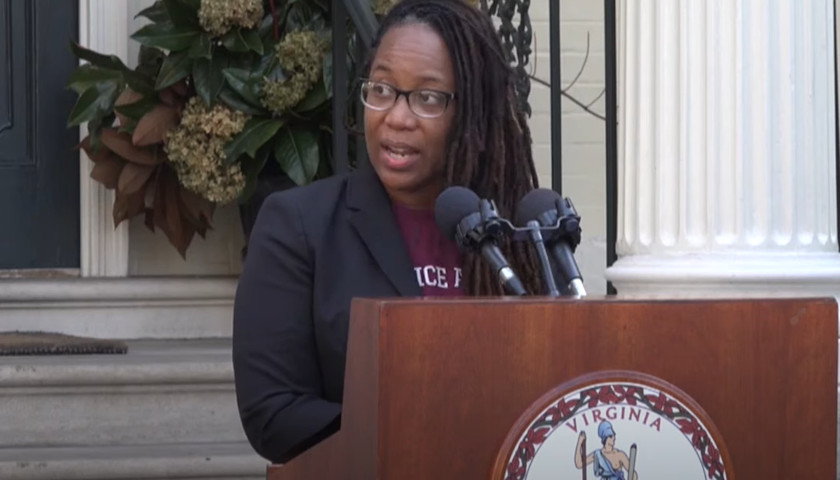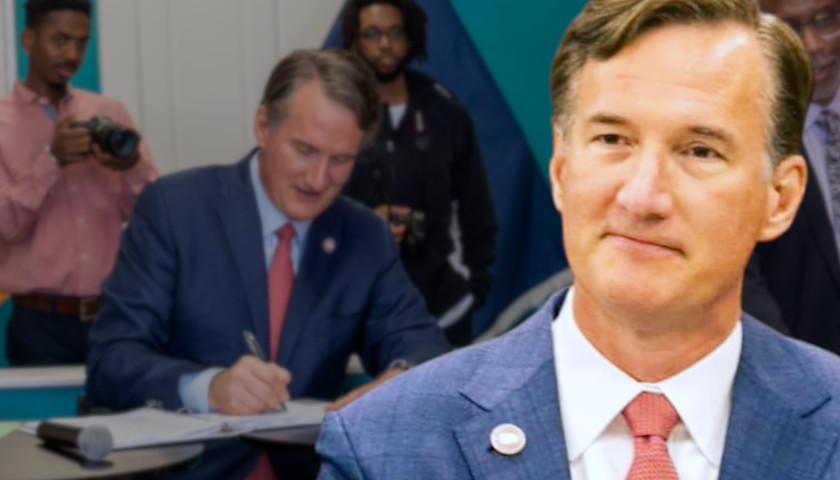Princess Blanding, the sister of Marcus-David Peters who was shot and killed by Richmond Police during a mental health crisis, blasted Virginia Governor Ralph Northam and Democratic lawmakers over legislation named after her brother during the bill signing ceremony on Tuesday.
In attendance alongside Northam were the three legislative sponsors of the bill: Senators Jennifer McClellan (D-Richmond City) and Jeremy McPike (D-Prince William) and Delegate Jeff Boure (D-Richmond City).
After thanking the legislators for their efforts, Blanding said: “Please take a moment to pat yourselves on the back for doing exactly what this racist, corrupt system, and broken may I also add, expected you all to do: Make the Marcus Alert bill a watered down, ineffective bill that will continue to ensure that having a mental health crisis results in a death sentence. Marcus-David Peters, along with so many others, deserved help, not death.”
“I say to each and every one of you: Fix it. The bill is an ineffective bill,” Blanding added.
Blanding also criticized Democrats for making the civilian review board legislation ineffective, killing a bill to end qualified immunity for law enforcement officers and for refusing to meet a list of demands Peter’s family sent to elected officials in Richmond, but did not give specific reasons for her criticisms of the original legislation.
The bill directs the Department of Criminal Justice Services (DCJS) and the Department of Behavioral Health and Developmental Services (DBHDS) to work together and establish a mental health awareness response and community understanding services (Marcus) alert system across Virginia.
Once developed, the alert system would use community care or mobile crisis response teams, consisting of mental health professionals and law enforcement officers, to respond to 9-1-1 calls when a person may be experiencing a mental health problem or people with substance abuse and developmental disabilities.
Specifically, the law outlines that by December 1, 2021, Marcus alert programs and response teams should be established in each of the state’s five behavioral health regions, and for additional programs to be created until every locality is served by one in July 2026.
However, the bill does not limit the involvement of law enforcement officers in those scenarios or regulate the use of lethal weapons while responding to a situation.
McClellan, who is running for governor in 2021, said the legislation was a first step and that for years Virginia’s mental health system has been strained to its breaking point.
“Yes, this bill doesn’t go far enough,” McClellan said.
“We have to put the structure and the funding in place to make sure that what happened to Marcus-David Peters doesn’t happen again,” she continued. “So, while this is a first step. It cannot and will not be the last.”
Bourne, who introduced the House version of the legislation, committed to getting the bill right and to make adjustments if need be as long as he served in the General Assembly.
“While the bill may not be perfect, we are going to work as hard as we can to save as many lives [as possible] and get people the treatment and health that they need,” Bourne said. “Because for far too long, not only in the Commonwealth, but in this country, we have criminalized mental health rather than treated mental health. And so, this bill might be a small step in that journey.”
The long delegate also shared that in advance of the special session he knew he wanted to introduce a bill for an alert system, but called Blanding to get her support.
During his remarks, McPike said first responders know they do not currently have the necessary tools or training to respond to specific crises.
“This is a significant and major culture shift that says we’re going to put in resources where it matters. To the front lines, to make an immediate difference in people’s lives, the potential to interact and save a life, to redirect and divert people early, not into the criminal justice system, not behind bars, but into a place that can actually provide a framework of support to connect the dots to resources, to meaningful changes in people’s lives,” McPike said during the event.
In May 2018, Marcus-David Peters, a 24-year-old high school biology teacher, was experiencing a mental health crisis that resulted in him hitting multiple vehicles with his car and then running nude on Interstate-95, which is when a Richmond police officer made contact and eventually fatally shot him.
According to previous reporting from The Virginia Star, in November of this year, Richmond Commonwealth’s Attorney Colette McEachin determined that the use of force against Peters was justified and shared intricate details of the events that transpired in a report investigating the incident.
A link to a live stream of the full ceremony can be found here.
– – –
Jacob Taylor is a reporter at The Virginia Star and the Star News Digital Network. Follow Jacob on Twitter. Email tips to [email protected].
Photo “Princess Blanding” by Richmond Times-Dispatch.





